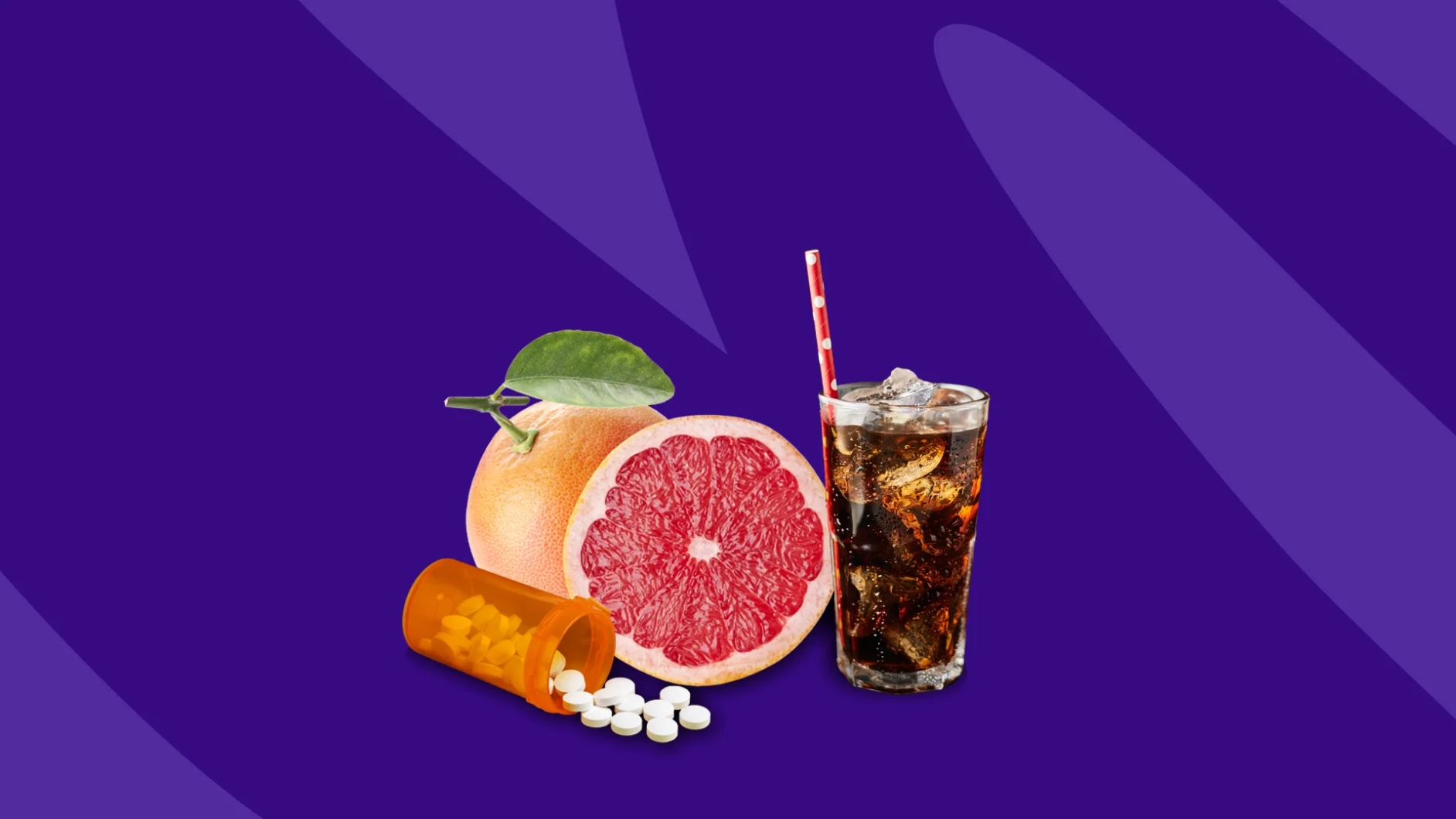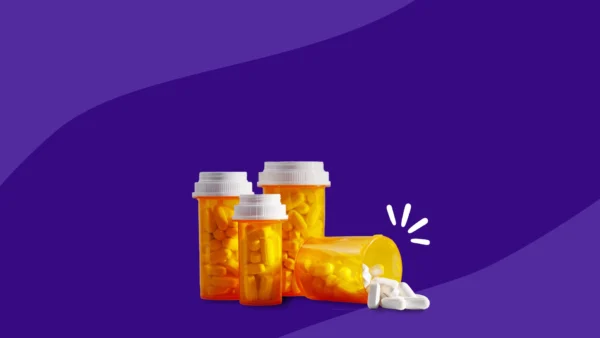Key takeaways
There are no known drug-food interactions with lamotrigine.
It’s a good idea to avoid sugary foods, aspartame, caffeine, and alcohol while on lamotrigine because these foods may exacerbate symptoms of epilepsy or bipolar disorder.
Many providers also suggest avoiding grapefruit and grapefruit juice while taking prescription medications because this fruit can impact metabolism and influence the drug levels in your body.
While on lamotrigine, focus on eating a low-sugar, nutrient-dense, healthy diet. A healthy diet is beneficial for overall health.
Lamotrigine is a prescription drug used to treat epilepsy and bipolar disorder. Some providers also prescribe this drug off-label for migraine prevention. Lamotrigine is the generic form of brand-name drugs Lamictal and Lamictal XR (an extended-release form of lamotrigine) by pharmaceutical manufacturer GlaxoSmithKline (GSK).
Like most drugs, lamotrigine has risks and side effects. There are no specific drug-food interactions with lamotrigine, but you may want to avoid foods that could trigger seizures, impede drug absorption, or exacerbate side effects. Consider limiting or avoiding grapefruit, sugary foods, aspartame, caffeine, and alcohol.
How lamotrigine works
“[Lamotrigine] lessens the release of glutamate, the substance that stimulates brain activity,” explains Inna Melamed, Pharm.D., a functional medicine practitioner and author of Digestive Reset. In other words, lamotrigine works by slowing down nerve activity, which can control seizures and act as a mood stabilizer. According to Dr. Melamed, when you first start the medication, it may take about six weeks to get the full therapeutic effects.
5 foods to avoid with lamotrigine
“There are no known interactions with food and lamotrigine,” says Christina Madison, Pharm.D., founder of The Public Health Pharmacist. However, certain foods may still affect your successful treatment with lamotrigine. If you’re on lamotrigine, it’s a good idea to avoid foods that may trigger seizures, worsen side effects, or impede the absorption of your medication.
The list below outlines the foods to avoid or limit while taking anticonvulsants such as lamotrigine.
1. Grapefruit juice
Experts agree: Grapefruit and grapefruit juice are among the foods you shouldn’t mix with medicine. According to the U.S. Food & Drug Administration (FDA), this citrus fruit can affect how the body metabolizes drugs resulting in unsafe levels of the drug in your body.
“Even though no direct interaction has been noted between grapefruit and lamotrigine, it’s best to be cautious,” says Dr. Melamed. “Grapefruit is known to interact with other medications used for epilepsy or bipolar disorders.”
Of course, grapefruit is not the only food that doesn’t mix well with drugs. Other commonly suggested foods to avoid mixing with medications include dairy (cheese and milk), bananas, and black licorice. However, none of these drugs are contraindicated with lamotrigine. You may limit them out of an abundance of caution, or you can talk to your doctor about dietary restrictions specific to your medications and conditions.
2. Sugary foods and drinks
Some healthcare providers advise patients with epilepsy to avoid or limit high-sugar foods and beverages. That’s because high blood sugar levels have been associated with an increased risk of seizures in at least one form of epilepsy.
From the low glycemic index diet to the ketogenic diet, mainstream dietary therapies for epilepsy often involve decreasing sugar consumption. The exact reason why is not fully understood, but foods that quickly raise blood sugar, causing energy spikes followed by slumps, can be problematic for people with epilepsy.
While some people with epilepsy find that low-sugar diets like keto or a modified Atkins help reduce symptoms, it’s a good idea to consult your healthcare provider before going on a specialized diet.
3. Aspartame
Aspartame is an artificial sweetener found in diet sodas, sugar-free gum, and “many other ‘low-calorie’ foods,” says Dr. Melamed. Due to potential neurophysiological effects, she advises limiting aspartame if you’re taking lamotrigine for seizures.
Indeed, aspartame has been linked to seizures, though more research is needed to understand the connection entirely. A recent report in the scientific journal Nutrients stated that the research suggests that aspartame “may pose some dangers” in patients with seizures or other neurological diseases.
4. Caffeine
Caffeine does not interact with lamotrigine, but it may exacerbate bipolar disorder symptoms such as agitation, irritability, restlessness, and trouble sleeping. In large amounts, caffeine may also increase seizure susceptibility.
People with bipolar disorder are usually advised to avoid this stimulant. Still, a scientific review of 17 studies found that the effects of caffeine in patients with bipolar disorder are still not fully understood. Caffeine may trigger manic symptoms in some patients, but it could also be that manic symptoms like impulsivity lead to an increase in caffeine intake.
Ultimately, it’s a good idea to get medical advice from a healthcare professional before consuming caffeine with your dose of lamotrigine. Please be aware that caffeine doesn’t only come from coffee. Drinks and foods high in caffeine include chocolate, kola nut, tea, and yerba mate.
5. Alcohol
There are no known interactions between alcohol and lamotrigine, but drinking alcohol can exacerbate the nervous system side effects of this medication, says Dr. Melamed. Specifically, alcohol may worsen dizziness, drowsiness, and difficulty concentrating. Blurred vision and lack of coordination are also common side effects of lamotrigine. These are also consequences of drinking alcohol, so mixing the two substances may increase the speed and severity of these side effects.
Overall, it’s best to avoid, or at least limit, alcohol use with lamotrigine.
Herbs and supplements to avoid with lamotrigine
“There are no specific interactions with herbal products or supplements and lamotrigine,” says Dr. Madison. “However, if someone is taking multiple vitamins or supplements, they could possibly interact with each other.”
Though lamotrigine has no known negative interactions with herbs or supplements, there are potentially dangerous drug-drug interactions. Combining lamotrigine with amifampridine, dalfampridine, Wellbutrin (bupropion), or metoclopramide can increase the risk of seizures. Other drugs may be combined with lamotrigine, but only at certain doses and under close supervision by a healthcare provider. These include certain birth control pills, anticonvulsants (such as carbamazepine), antidepressants, antipsychotics, sedatives, muscle relaxants, and other central nervous system depressants.
Bottom line: Speak with your healthcare provider about any dietary supplements or over-the-counter or prescription meds you’re taking. That way, they can make you aware of any potential interactions when prescribing lamotrigine or other medications.
What should you eat while taking lamotrigine?
There are no specific foods that will boost lamotrigine’s efficacy, but what you eat while taking lamotrigine still matters. In many ways, it’s more important to focus on what you should eat rather than what you should avoid. And what you should eat is a healthy diet.
In addition to filling your plate with foods that support mental health, like lean meats, fresh produce, and whole grains, you can prioritize foods that won’t spike your blood sugar. These foods—known as low glycemic index foods—include eggs, apples, bananas, and Greek yogurt.
Gastrointestinal side effects of lamotrigine
The most common gastrointestinal adverse effects of lamotrigine include nausea, vomiting, sore throat, and dry mouth. A few of these common side effects may be exacerbated by the foods mentioned above, which is another reason to consider monitoring your diet. For instance, acidic or carbonated drinks (such as grapefruit juice or sugary soda) may worsen a sore throat or nausea from heartburn.
It’s not always possible to avoid lamotrigine side effects. However, you may be able to reduce side effects by working with your provider to adjust your dosage. You can also reduce your risk of serious side effects by talking to your prescriber about your medical history, allergic reactions to previous medications, serious side effects (including suicidal thoughts) from previous medicines, pregnancy or plans to become pregnant, and breastfeeding or plans to breastfeed.
Finally, always take lamotrigine as directed by your prescriber. Contact your healthcare provider if you have any questions or concerns about lamotrigine.
Sources
- Half life, StatPearls (2023)
- Grapefruit juice and some drugs don’t mix, Food & Drug Administration (2021)
- Hyperglycemia lowers seizure threshold, Epilepsy Currents (2003)
- Dietary therapies for epilepsy & seizure disorders, NYU Langone Health
- Impaired glucose metabolism in bipolar patients: the role of psychiatrists in its detection and management, International Journal of Environmental Research and Public Health (2019)
- Neurophysiological symptoms and aspartame: What is the connection, Nutritional Neuroscience (2017)
- Aspartame safety as a food sweetener and related health hazards, Nutrients (2023)
- Caffeine and seizures: A systematic review and quantitative analysis, Epilepsy & Behavior











